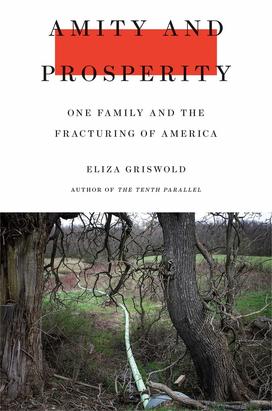Eliza Griswold ’95 Recounts a Modern Tragedy
The book: In the late 2000s, the natural-gas boom brought large gas companies to Appalachia. They arrived with leases for local landowners, which promised substantial cash in exchange for the rights to frack for gas on their land. One small town they targeted was Amity, Pa.
Based on seven years of reporting, Amity and Prosperity (Farrar, Straus, and Giroux) looks at the impact of the fracking on Amity resident Stacey Haney and her family. After inviting the gas companies on to her property to drill, her children and pets became mysteriously ill. To find out the truth about how the resurgence of industry in the area was impacting health, she banded with neighbors to take the company to court.
The author: Eliza Griswold ’95 is the author of The Tenth Parallel: Dispatches from the Fault Line Between Christianity and Islam, which won the 2011 J. Anthony Lukas Book Prize. Her translations of Afghan women’s folk poems, I Am the Beggar of the World, was awarded the 2015 PEN Award for Poetry in Translation. Currently a distinguished writer in residence at New York University, she lives in New York with her husband and son.

After registering the rabbits, she proceeded to Cowley’s lemonade stand with her eleven-year-old daughter, Paige. Thirty miles southwest of Pittsburgh, the Washington County Fairground was composed of two worlds. The lower realm contained the Tilt-A-Whirl operated by strangers, roustabouts who arrived from elsewhere. (Stacey’s son, Harley, who’d just turned fourteen, called it Carnyland.) The upper belonged to 4-H and agriculture—“ag”—types, many of whom, including Stacey’s family, considered themselves Hoopies, an insider’s name for the hill jacks or hillbillies who live in the borderlands of Pennsylvania, Ohio, and West Virginia where Appalachia begins.
These two worlds met midway up the ridge at Cowley’s, where Stacey and Paige were waiting for lemonade when they spied two familiar figures trundling downhill from the horse barn. The square woman with frosted hair and the spare man with a snowy mane and a limp were Beth and John Voyles. They lived next door at Justa Breeze, a fifteen-acre farm where they trained horses and bred high-end dogs. The two families shared a fence and a love of animals. Beth treated her boxers like children. She cooked them angel hair pasta, zucchini, and meatball sandwiches, and dressed them in tiny leather jackets, flight goggles, and scarves for professional photographs. She framed the photos and hung them around the ranch house where she’d lived with John for the past twenty-eight years.
Say what one might about the Voyles, over the past year and a half, they’d proven excellent neighbors. While Stacey, forty, juggled full-time shifts as a nurse in the recovery unit of Washington Hospital and finalized her divorce from Larry Haney, the Voyles kept a quiet eye on her place. Their daughter, Ashley, often brought her new boxer puppy, Cummins, down to distract Harley when he was sick at home. At twenty-two, Ashley still lived at home and raced horses professionally. She’d also been teaching Paige to ride since Paige was two.
As Beth and John approached, Stacey could see that mascara was running down Beth’s ruddy face. Stacey guessed it was the muggy heat; the air at the fair was redolent with popcorn and musk, which mingled with the scent of baby shampoo from the Mane ’n Tail lingering on Stacey’s arms. A rash blazed on Stacey’s left arm, where it had been erupting on and off for months. Although she was a nurse, she couldn’t determine its cause. She studied the welts, and when she looked up, Beth was in front of her, her face smeared with tears.
Cummins is dead, Beth said. Poisoned.
Stacey’s head swam. In her mind, she scanned the farmhouses and trailers that wended their way from the top of the valley where she and Beth lived down McAdams Road to the base of the hollow called the Bottoms. She knew nearly everyone. Many families were bound by generations of helping one another farm and, more recently, survive the economic collapse of the past several decades.
No one would poison a puppy, she told Beth gently. Beth thought otherwise. The vet had told her that Cummins’s insides had frozen up, she said, crystallized, as if he’d drunk antifreeze. The vet couldn’t rule out cancer, either, but Beth suspected foul play. She also thought she knew where the poison had come from: she’d seen the dog drinking from a puddle of water left on the roadside after a truck came through to spray down dust earlier that summer. Wondering what the liquid was, she’d tried to follow with a glass Mason jar, but the driver stopped. Screeching his air brake on the steep dirt hill, he yelled at her to back away.
Later, Beth and Stacey would mark this conversation about Cummins’s death as the beginning of solving a mystery. But at the time, Stacey was sweaty and distracted. Paige stood by, crunching the sugar at the bottom of her cup. Stacey hugged Beth and watched her continue down the hill with John toward the field of neon. She wanted to get back to the trailer to check on Harley. She dreaded telling him the news.
Reviews: "Amity and Prosperity is at heart a David and Goliath story fit for the movies. It has everything but a happy ending: bucolic setting concealing fortune and danger; poor but proud locals who've endured sequential boom bust cycles of resource extraction . . . tough, reluctant victim-heroes . . . and a courtroom drama, as a tenacious husband-wife legal team takes on the industry and the state . . . [a] valuable, discomforting book" —JoAnn Wypijewski, The New York Times












1 Response
Alene Levin
6 Years AgoA Great Book
Your book is great. Going to see if it's in a book store. Almost done with it.